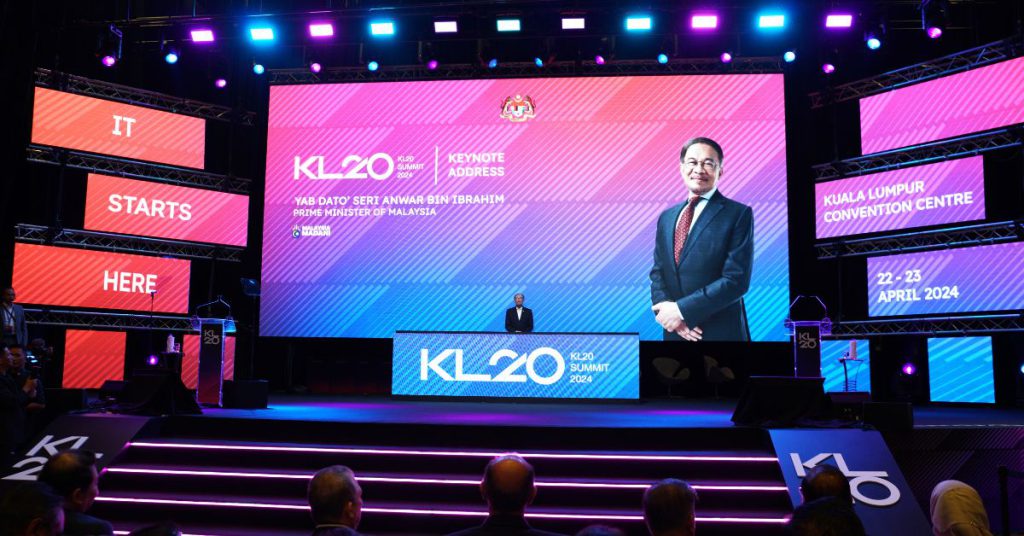At the much-anticipated KL20 Summit 2024, there was a palpable sense of excitement and hopefulness in the air.
Held in the Kuala Lumpur Convention Centre on April 22 and 23, the event brought in industry leaders from all over the globe, all of them looking towards the same vision—a Kuala Lumpur that ranks as a top 20 global startup hub by 2030.
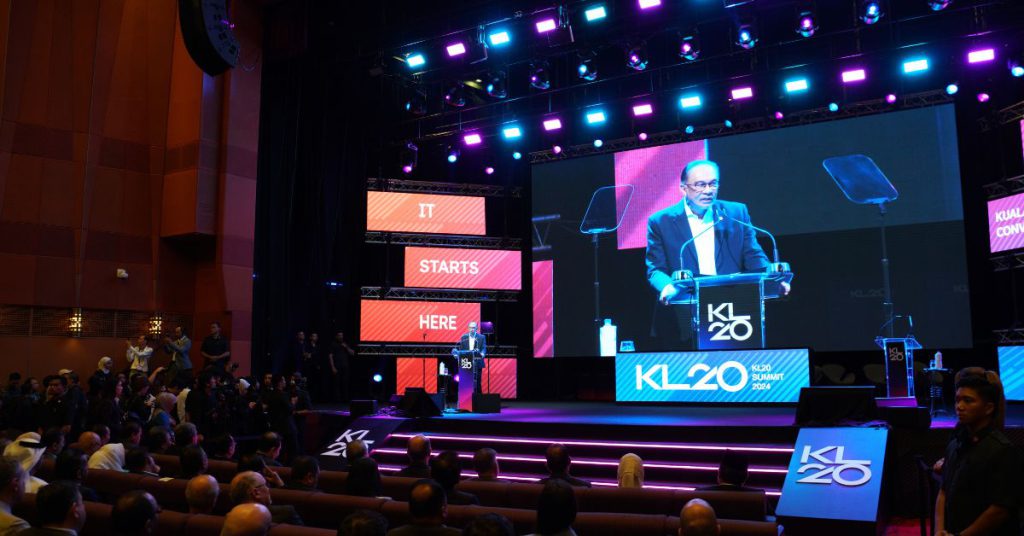
According to Startup Genome’s books, Kuala Lumpur was already considered 20th in the World’s Strong Starters Ranking in 2023. But as of 2022, we hadn’t broken the top 30 yet in terms of the overall ecosystem ranking.
Basically, we’ve got the potential. But there’s a lot of work left to be done.
With that in mind, the KL20 Summit saw the launch of an action paper titled “Unleashing the Full Potential of Malaysia’s Startup Ecosystem”. This paper outlines what the Malaysian government is doing in order to push Kuala Lumpur forward as a startup hub.
Here’s what you need to know.
1. Going all-in on these key sectors
In 2023, Startup Genome had highlighted three “sub-sector strengths” in Malaysia, which were fintech, ecommerce, and healthtech.
But in the Action Paper, the four industries that were specifically highlighted were: energy & green technology, manufacturing and automation, agricultural technology, and Islamic finance.
2. Building a new “belt”
You might’ve heard of the Sun Belt, the Corn Belt, or the Rust Belt. These are popular terms in the United States used to refer to strips of states that share cultural or economical commonalities.
But here’s a new one in Malaysia—the Innovation Belt. Uniting ecosystem players in one area, this seeks to enable collaborations.
Here’s how the envisioned “belt” will look like:
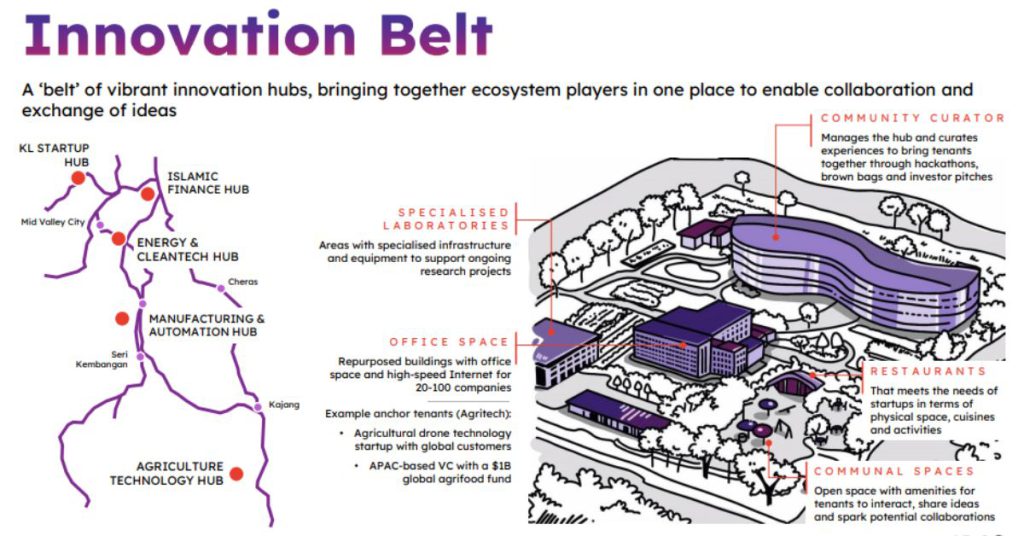
The specific “hubs” that underpin this belt will be the KL Startup Hub, the Islamic Finance Hub, the Energy & Cleantech Hub, and the Agriculture Technology Hub.
3. Incentives for VCs to set up shop in Malaysia
Capital is important, which is why much of KL20 was focused on showcasing Malaysia to potential investors, particular venture capitalists (VCs).
To attract more VCs to branch into Malaysia, the government has created some initiatives.
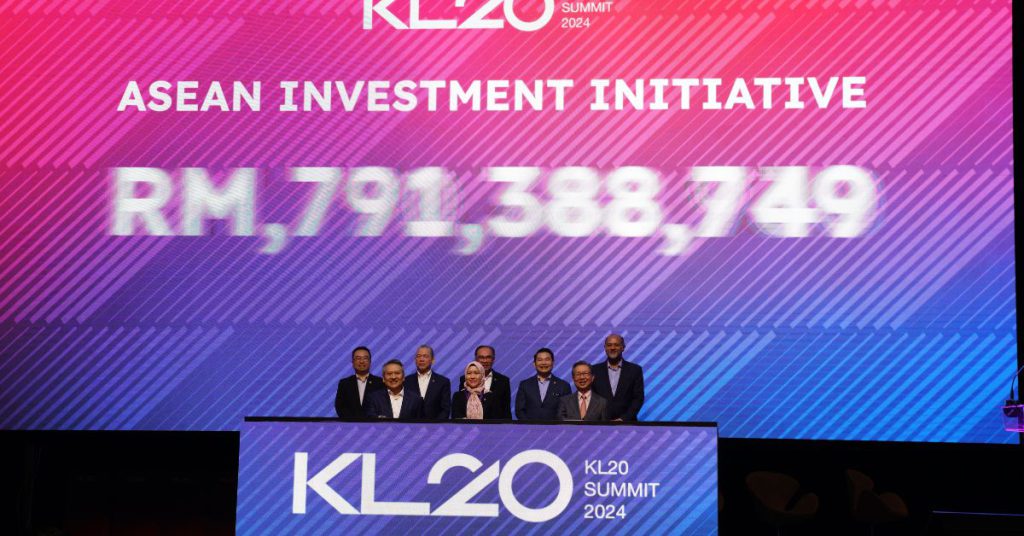
First, there’s the VC Golden Pass. This targets firms that are a top 100 global or regional VC with AUM (Assets Under Management) of more than US$100 million, and have a strong multi-year track record of investing in and scaling successful tech startups.
The pass offers:
- LP (Limited Partners) funding opportunities from institutional investors
- Secured office space in established startup hubs
- Visa fee exemption for senior leaders
- Networking opportunities with startups, investors, and corporate leaders
- Expedited licence approval for fund setup
In exchange, these VCs must establish a physical office in Malaysia, invest in Malaysian and ASEAN-based startups, and also hire a locally based team to support operations.
There’s also the VC Launch Fund to support the creation of new local VCs to widen funding and investment options for Malaysia’s seed and early-stage startups.
To be eligible, these new funds must be headquartered in Malaysia, focus on seed and pre-seed stage investments, with a target allocation of above 50% being in Malaysia.
Finally, there are plans for a VC Academy to upskill professionals looking to enter the venture capital industry. A four-week course, it is designed for first-time fund managers, new VC analysts, and other young professionals.
The syllabus will cover fundamental skills, knowledge, and an introduction to the local VC landscape,
4. Incentives for startups
In order to attract globally recognised startups to set up a significant presence in Malaysia, the Unicorn Golden Pass was created.
Under this pass, the benefits are:
- Funding opportunities from leading VC investors
- Visas for the team with fee exemptions
- Concessionary tax rate on corporate profits
- Top-tier office space within a startup hub
- Industry-specific benefits tailored to the company
In return, the startup must establish a physical office in Malaysia, build a leadership team here, and also hire a locally based team to support regional operations.
There are other criteria involved, of course. Startups who want to apply for this pass must have a high valuation, be validated by the market, and should also be sustainable long term.
5. Incentives for founders and talents
It’s impossible to carry out all these plans for the ecosystem without the right people. As such, the government also introduced an Innovation Pass.
This is a holistic visa programme that makes it easy for founders and talent to work in Malaysia.
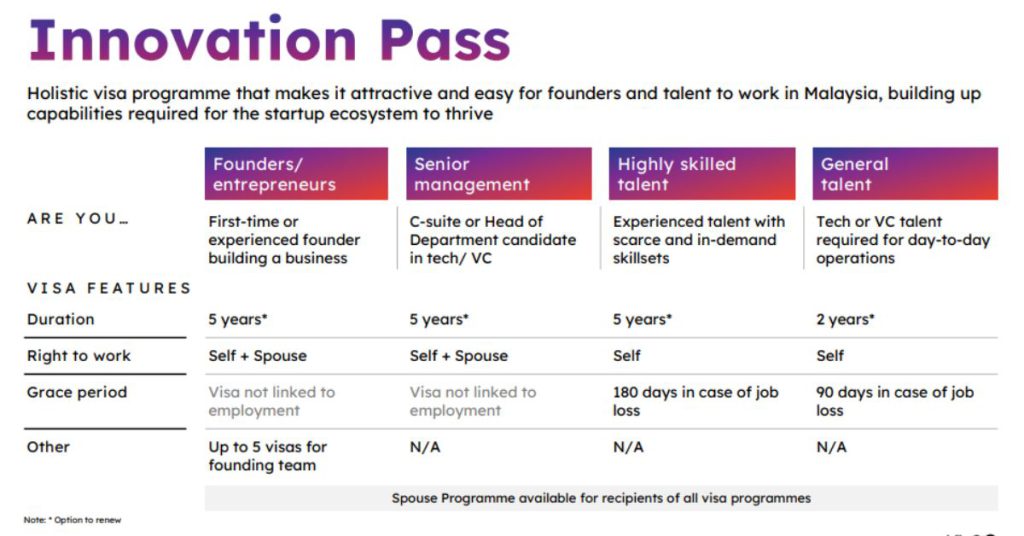
There are specific visa features for founders, senior management, highly skilled talent, as well as general talent. For founders, the pass also grants them up to five visas for the founding team (AKA co-founders).
For founders and senior management, their spouses will have the right to work as well.
They’re also supported by a two-week spouse programme to help them settle in and build a meaningful career in Malaysia.
Ensuring a seamless experience for foreign talents moving to Malaysia, there’s the Founder & Talent Relocation Service that involves consultations, housing assistance, family support, logistics support, admin support, and more.
6. Growing the skills and talents in Malaysia
To cultivate talents, Skills@Scale is a tech skills marketplace to upskill trainees by matching them with experienced trainers from a variety of different backgrounds.
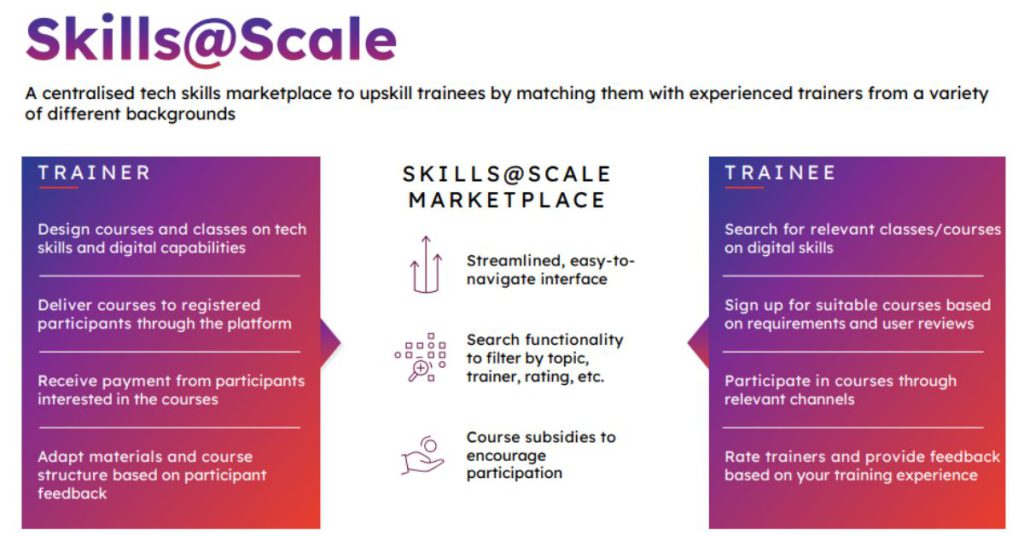
There’s also a three-month programme called Executive Digital Leadership to equip leaders with critical digital capabilities and knowledge to uplift Malaysia’s digital economy.
This programme will be delivered by experts via a blended model that involves in-person and online classes that are curated by MIT.
7. Building a conducive, streamlined ecosystem
The Malaysian startup ecosystem is vast. And with the new programmes, there’s more information than ever to digest for those wanting to break into the scene.
That’s why the Startup Concierge and Single Window are so vital.
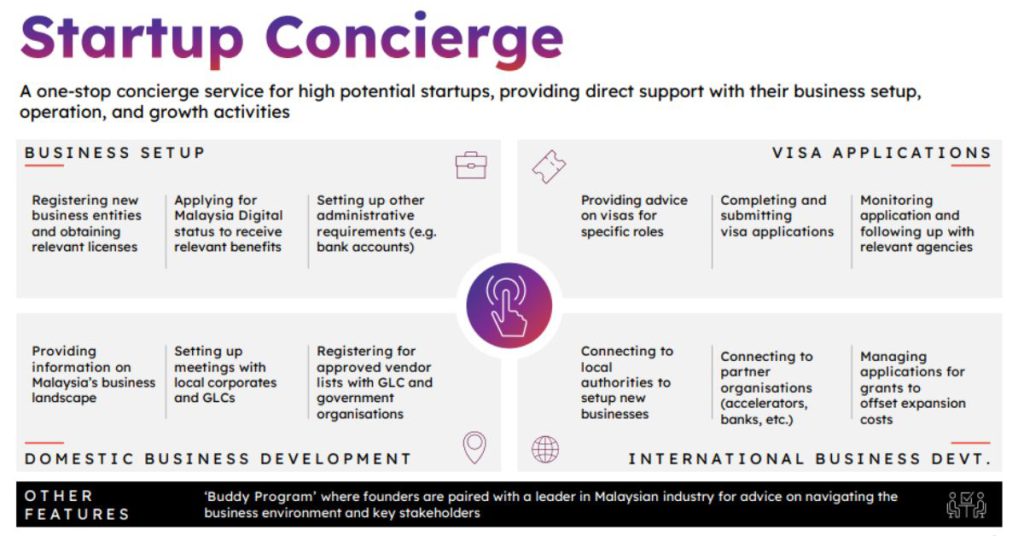
The Startup Concierge is a one-stop concierge service for high-potential startups, providing them direct support with business setup, operation, and growth activities.
Meanwhile, the Single Window is something we’ve been anticipating for a while, since it was even mentioned in the last Budget.
This Single Window is MYStartup, and it’ll be one platform with everything industry players could need, including a startup database, business information, and other resources. Talents, investors, and entrepreneurs will all be able to make use of this.
8. Looking beyond the country
A crucial component to propel Kuala Lumpur into the top startup hubs in the world is by zooming out.
A recurring statement throughout the summit was that Malaysia is “open for business”. That’s why there are so many incentives to bring in foreign talents and funds, while still cultivating our own.
And similarly, startups must also look outward and be well-connected with the region and subsequently the globe.
As such, Startup City Connect is an effort that aims to foster deep collaboration and integration between Malaysia and other major regions and economies. This will allow startups to operate seamlessly across markets.
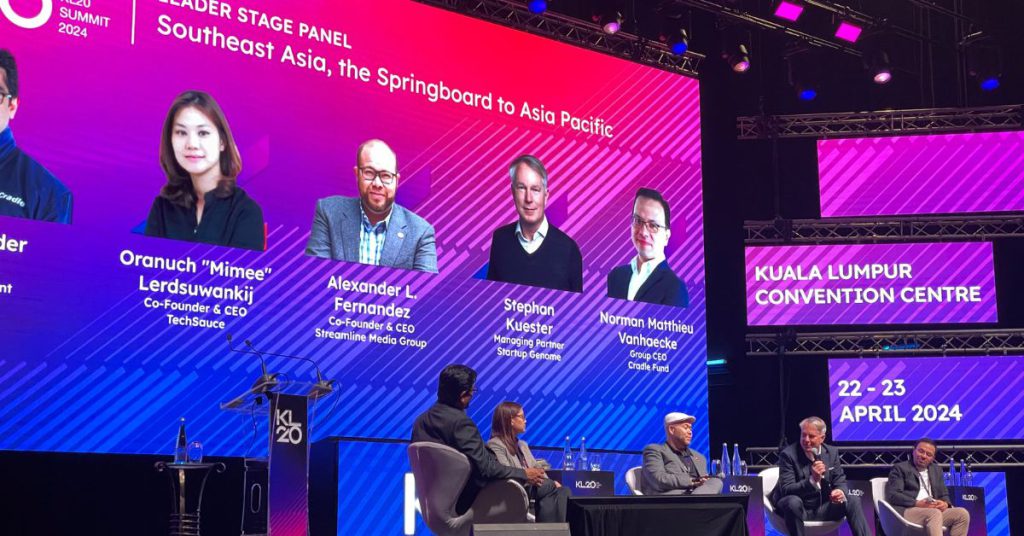
During the Summit, Intrinsic Innovations, a Canada-based VC firm, showcased its Malaysia-North America Bridge to connect Malaysian entrepreneurs with North America. The summit also saw a Letter of Intent signing between KL and Hangzhou to form a city-to-city connection between the two regions.
Overall, through these various programmes and efforts, we’re hopeful and excited to see the Malaysian startup landscape grow and change right before our very eyes.
Now, it’s time to make good of the Action Paper as we set sail on the journey to become the top 20 startup hubs in the world.
- Learn more about the Action Paper here.
- Read other articles we’ve written about Malaysian startups here.
Featured Image Credit: KL20 Summit 2024



